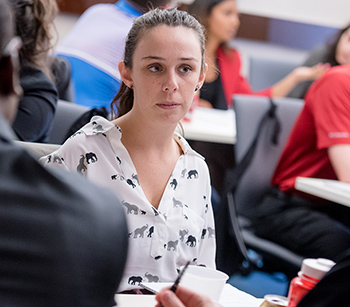
Jessica Kleinman
About a month after USC Shoah Foundation’s Intercollegiate Diversity Congress (IDC) Summit, Georgia College Student Government Association Senator Jessica Kleinman is still abuzz with ideas for positive change on her campus inspired by the Institute. And with testimony clips and other USC Shoah Foundation education resources at her ready, she’ll have abundant opportunities to make an impact.
Kleinman first heard about the possibility of attending the IDC Summit through USC Shoah Foundation postdoctoral teaching fellow Sara Brown, an organizer who encouraged Kleinman to come and learn about the Institute’s testimony-based resources. As she learned more, the economics major grew excited about the Institute’s work promoting and celebrating diversity.
“The mission of the organization resonated with me and compelled me to take action and get involved,” Kleinman said.
At the IDC Summit on Oct. 13-14, the 20 participants – student leaders from universities across the country – learned about the Visual History Archive, IWitness and strategies for using testimony to promote tolerance and inclusion on their campuses. They also learned how to construct their own activities in IWitness and had dinner with Yannick Tona, a child survivor of the Rwandan Tutsi Genocide who is now a motivational speaker in the United States.
“At the conference, I met with inspiring student leaders from around the country and exchanged ideas that proved invaluable,” Kleinman said. “My cohorts came up with such strong and meaningful ideas that were extremely helpful [to my own goals at Georgia College], and the presenters and students imparted quite a bit of knowledge.”
Watching some testimonies at the summit, Kleinman realized how valuable the screening of these stories could be on her campus in compelling students to take action when they see injustices happening. General apathy, Kleinman said, has long been a problem on her campus.
“It was an unforgettable and very meaningful experience that left me with the tools and desire to spark change on my campus,” Kleinman said. “An issue on my campus is the lack of active bystanders willing to incite change and take action on some of our biggest issues like sexual assault. I found many testimonies about people who took charge and did what they believed to be right, despite the possible ramifications.”
Kleinman realized quickly that these testimonies could be incorporated into presentations given on overcoming passivity on her campus.
“After the summit, I brought back copious ideas for concrete action on campus and specific events centered around utilizing testimonies,” Kleinman said. “I plan on using multiple testimonies in our annual candlelight vigil for Yom HaShoah.”
At universities the size of Georgia College, it can be easy to get lost in the shuffle and wall oneself off from social responsibility. Kleinman, who hopes to work in the nonprofit sector after she graduates this year, thinks that organizations like USC Shoah Foundation show the public why apathy is unacceptable.
“The value of these events and of organizations like USC Shoah Foundation lies within the impact it has on individual students and campuses, and its way of compelling students to take action,” Kleinman said. “At the summit, it was so useful to see how other students planned to build events using testimonies, to the end of inciting self-reflection on the part of the individual within the larger narrative of the issue. I find myself now trying to incorporate a time of introspection into events, as it serves as a powerful tool in beating the idea that you can’t do anything to challenge and change issues. This will prove integral to my programming, as many students need that added push to get involved.”